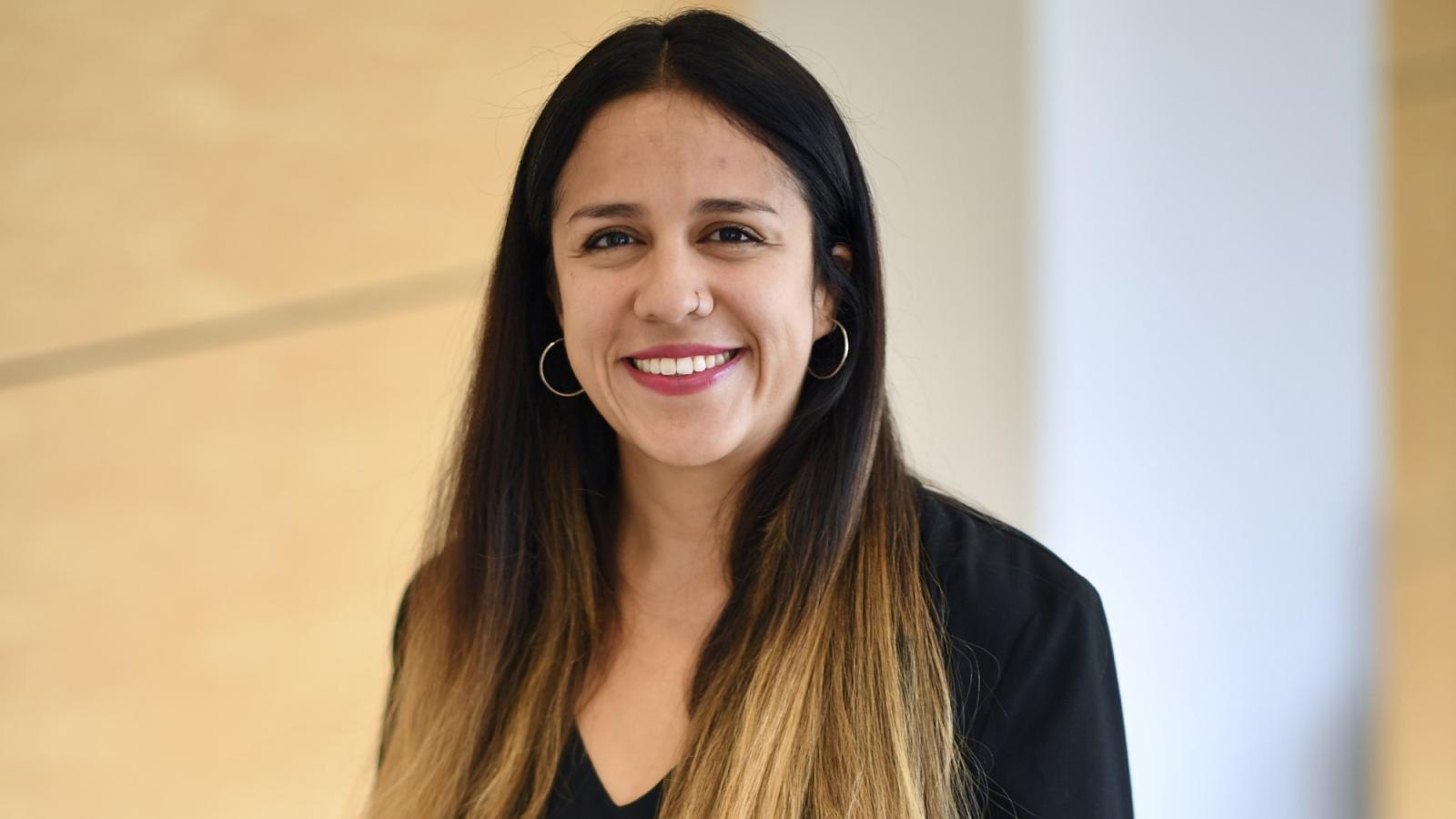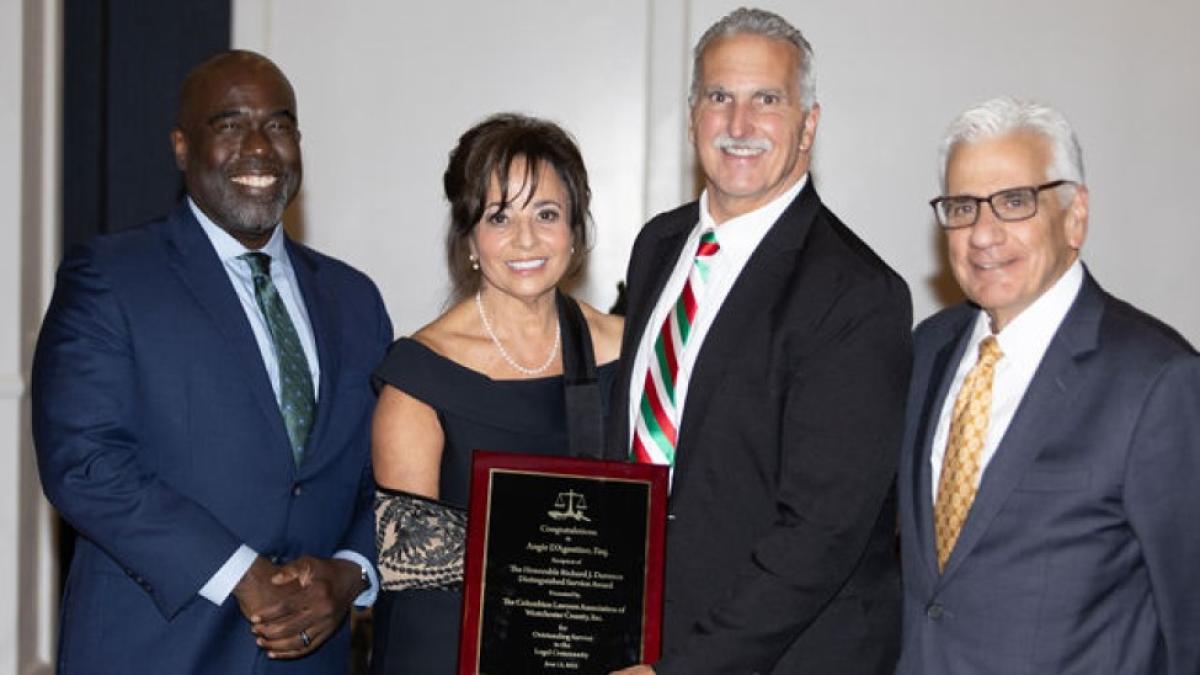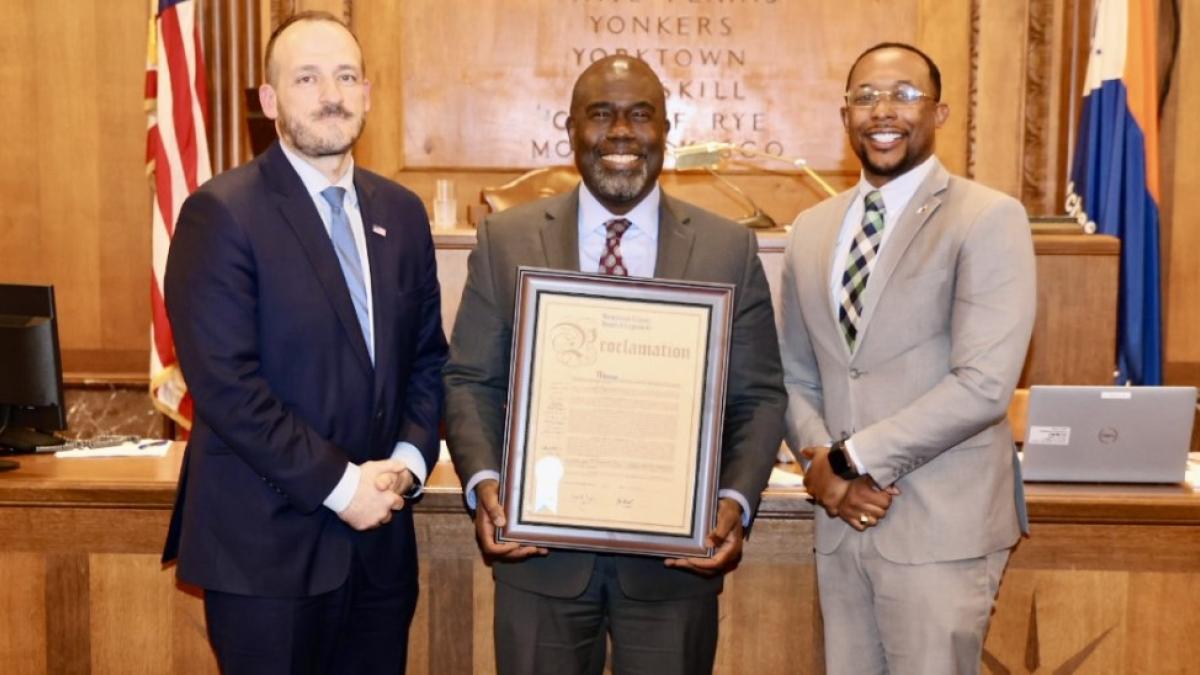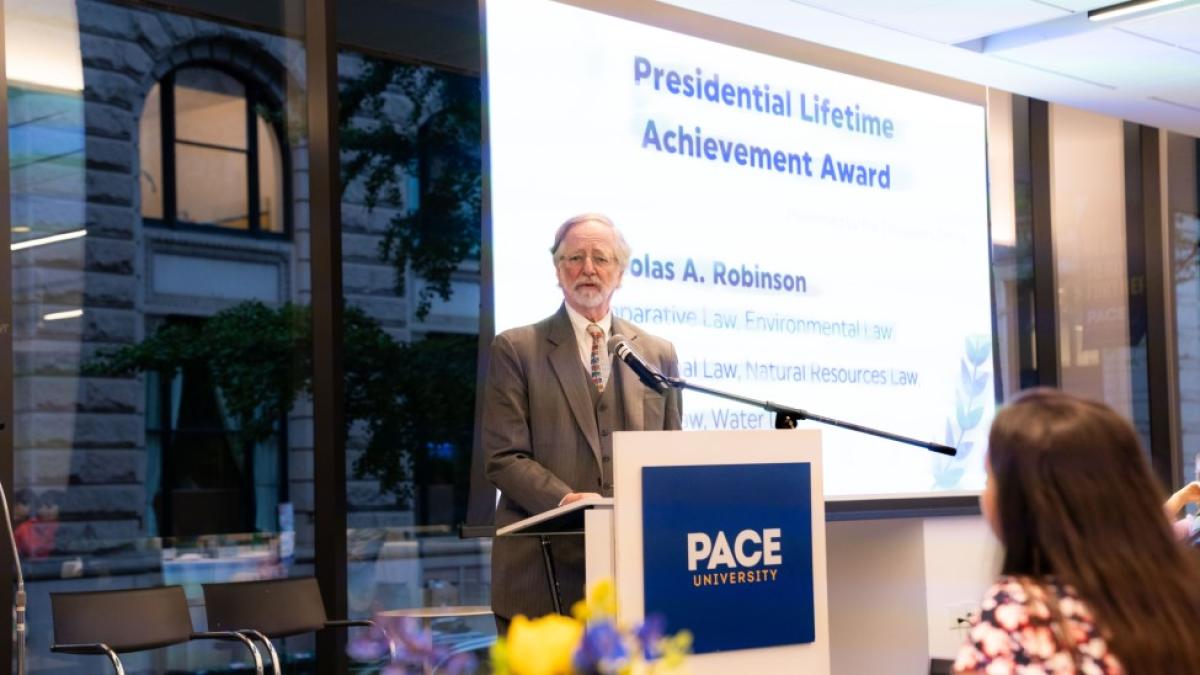Angie D’Agostino, Dean for Student and Campus Affairs at the Elisabeth Haub School of Law at Pace University, was honored with the Honorable Richard J. Daronco Distinguished Service Award by the Columbian Lawyers Association of Westchester County at the organization’s annual dinner on June 13, 2025. The prestigious award recognizes individuals of Italian heritage who have made significant contributions to the bench or bar and who exemplify service, leadership, and a deep commitment to community.
Faculty Focus: Professor Camila Bustos

Assistant Professor of Law, Professor Camila Bustos, is originally from Bogota, Colombia and specializes in human rights law and climate change law. Prior to joining Haub Law, Professor Bustos was a Visiting Assistant Professor of Human Rights at Trinity College and a Clinical Supervisor in human rights practice at the University Network for Human Rights. She also served as a term law clerk to Justice Steven D. Ecker of the Connecticut Supreme Court and as a consultant with the International Refugee Assistance Project (IRAP). At Haub Law, she teaches an International Human Rights Seminar, an Environmental Law Survey course, and the Environmental Law Seminar: Climate Change & Migration. Learn more about Professor Bustos and the fresh, innovative perspective she brings to her research, scholarship, and the classroom in this Q&A.
Let’s jump right in, can you tell us a bit about your background?
I am originally from Bogota, Colombia and I moved to Miami when I was thirteen. This period in my life was deeply formative and continues to inform how I navigate and approach my personal and professional life. My time in Miami exposed me to different languages, cultures, and ways of thinking, which has always made me intellectually curious about meeting new people and traveling to new places. In addition to having Spanish as my native language, I have been learning Portuguese. I also try to stay connected to Latin American issues as much as I can (news, culture, music, etc.).
My time growing up in Miami also showed me the arbitrariness of borders and the way in which having legal status can transform someone’s life. Growing up in a city of immigrants and being an immigrant sparked my interest in immigration law – its development, limitations, and opportunities for change.
During college, I spent a lot of my time between research and advocacy spaces. I researched international climate politics, while engaging in fossil fuel divestment campaigns. I became interested in how law and policy can be leveraged to tackle problems like climate change. Afterwards, I spent two years working for a Colombian human rights organization before returning to the States for law school.
Your research interests and areas of expertise include human rights law, environmental law, international environmental law, and climate change law – what is it about those areas that hold your interest?
Climate change is one of the greatest challenges that humanity faces, if not the greatest. As with other environmental problems, climate change is inherently a global problem that requires international cooperation in addition to strong domestic action. These areas seek to understand how global politics and policies may hinder or facilitate progress.
I see environmental issues, including climate, as intrinsically human rights issues. They entail a range of impacts with severe consequences for the fulfillment of human rights, necessitating decisive State action to protect people and ecosystems.
Further development of human rights and environmental law is essential to hold accountable the most powerful actors behind the crisis, namely fossil fuel companies, carbon-intensive industries, ultrarich individuals, and top-emitter States. Despite its limitations, I am interested in how law can be leveraged by affected communities and individuals alike to seek justice in a deeply unequal world.
What are some of your current research interests and projects?
I am interested in continuing to think and write on the legal protection gap for climate displaced people at the international and domestic levels. I am also interested in further exploring the duties of States— as rooted in human rights law or ethics more broadly—to climate displaced people. My forthcoming article Climate Change and Internal Displacement in Colombia: A Tragedy Foretold? looks at the development of separate protection regimes for internally displaced people.
While there is a legal framework for those displaced in the context of armed conflict (e.g., think about abuela in the Disney movie Encanto), individuals displaced by environmental and climate events fall under the disaster policy framework. Through the case study of Gramalote, Colombia—the first municipality in Colombia displaced by climate-related events—I argue States must protect the right of populations to stay in place and return when possible.
I have also been researching the implications of climate change for the legal profession writ large, looking at the ways in which the climate crisis requires a transformation in how lawyers practice law and conceive of their professional responsibility. I am keen to explore legal ethics through a comparative perspective, focusing on the UK and the US for now. I am currently working on a book chapter for the forthcoming publication Educating lawyers for climate and environmental justice: theory and practice (2024).
You have recently published articles on climate migration and displacement – can you speak a bit more about that research area and the overall big picture impact you see that having on different people/groups and society as a whole?
Although exact figures on climate displacement projections vary, climate change will continue to force people to move internally and across borders. This is a tremendously complex issue, with implications for administrative, immigration, and international law, among others. I am keen to contribute to this debate for a few reasons.
First, climate change disproportionately impacts groups that have been historically marginalized or discriminated against. Displacement often impacts individuals with more limited resources to adapt and whose high exposure to climate risk might push them over the edge.
Second, the scale of the challenge requires scholars and practitioners to collaborate on policy gaps and potential solutions.
The last few articles I published focused on climate migration and displacement from different angles: (1) how do climate displaced people experience climate catastrophes, relocate, and establish new lives after displacement; (2) how does human rights law apply in the context of environmental and climate displacement in Central America and Colombia; and (3) what legal avenues, domestic and international, are available to protect climate displaced people whether internally or across borders?
Why did you want to become a professor?
It’s a bit of a funny story. For years, my partner had encouraged me to think about becoming a professor. I’ve always been intellectually curious and most of my professional experience before joining Pace involved significant research and writing. Before seriously considering academia, I was already writing articles “for fun” with colleagues. Even then, I thought I would practice law for several years before considering an academic position.
However, the opportunity to teach an undergraduate class and work closely with undergraduate and law students was transformative. I realized how amazing it was to be surrounded by students and how much more deeply I was able to think about issues when teaching and facilitating enriching discussions. Having a profession where you can teach, think, write, and collaborate is such an exciting and privileged career. Although becoming a professor was unexpected in some ways, I feel incredibly lucky to have joined the Pace community.
As a professor you are tasked with teaching students, but what have you also learned from them in return?
I love this question. I am going to cheat and quote Claudia Goldin, who recently won the Nobel economics prize for her groundbreaking work on wage inequality. During an interview, Goldin emphasized the role of students in her research:
“I am a professor; I am a teacher. I am standing here because I have my students. And my students are my muses; my students are the individuals I depend upon to listen to my ideas and react to them. Everyone should realize that teaching is the handmaiden of research. Research is knowledge creation; teaching is knowledge diffusion. And we do both.”
I learn from my students in every single class. They bring unique and fresh perspectives to new and old problems; they challenge me to crystallize my thinking and ideas. They make me a better thinker and scholar. Most importantly, they make me a better person by helping me question my own assumptions, biases, and paradigms.
What advice do you have for law students – generally and more specifically to those who want to gain experience in human rights law?
First, I would encourage students to try learning a second or third language if they can. While English remains the lingua franca in many international spaces, understanding other languages will open doors to different regions of the world and areas of practice. It also demonstrates humility and intellectual curiosity, which any future employer would value.
Second, I would advise students to engage with all the critical scholarship on human rights law. There are significant foundational and theoretical questions underpinning human rights practice. To name a few, are human rights universal? If so, what do we mean by that? Can human rights be a transformative project despite some of its practical limitations and historical origins? Reading critical approaches to international law (i.e., TWAIL or feminist critiques) makes us better human rights scholars and practitioners.
Third, find what you are passionate about. Human rights law is a broad area, encompassing a range of issues from racial discrimination, armed conflict, gender equity, environmental protection, etc. There are also different points of intervention: local, national, and international. I encourage students to think creatively about “human rights”, their own set of skills, and in what capacity they would like to contribute their talents.
You also co-founded Law Students for Climate Accountability (LSCA), a national law student-led movement pushing the legal industry to phase out fossil fuel representation and support a just, livable future – can you talk about what led you to found this movement and the importance of it? And, your best advice for how students can effect this type of very impactful push towards change like you did/have.
Like many others in my generation, I decided to go to law school to use the law to work on climate change issues. While I found the 1L doctrinal courses interesting, I found myself frustrated at both the failure of most 1L curriculums to address climate issues and the collective pressure to go work at a corporate law firm after law school.
While law firms are not monoliths, many of the largest and most prestigious firms conduct extensive lobbying, litigation, and transactional work on behalf of the fossil fuel industry. In response, a group of us decided to explore the ways in which “Big Law” upholds the fossil fuel economy and often hinders climate action by producing the first-ever Climate Change Scorecard.
Since 2020, LSCA has grown into a national and international movement, with colleagues in the UK, Canada, and Australia working on similar initiatives to hold the legal industry accountable. We have produced four iterations of the Climate Change Scorecard and have organized students across dozens of campuses in the United States.
My advice to students is to remember their own power to effect change. The legal profession and legal institutions are by default small “c” -conservative and resistant to change. It takes persistent and organized efforts to change social institutions, but it is possible.
As an undergraduate student, I remember several administrators and professors told us that fossil fuel divestment was simply “impossible” and would never happen. Today, more than twenty universities have partially or completely divested their endowment from fossil fuels and the movement has only continued to build momentum.
While I understand the pressure students face in securing a job after graduation, students shouldn’t forget that they hold the power of their talent.
Aside from law, how do you spend your spare time?
I love spending time with my dog Spice and must admit a lot of time goes into walking, brushing, and cuddling him. I also enjoy running and spinning —I am a huge Peloton fan (sorry not sorry). Aside from that, you can find me singing and dancing to Bad Bunny or Taylor Swift on repeat, going on walks and hikes across Connecticut, and attending concerts and music festivals with my partner.


